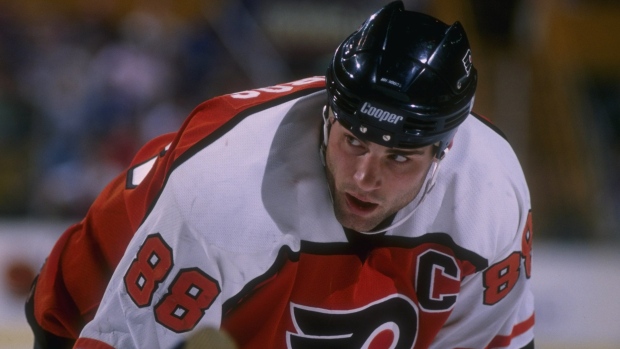Jun 26, 2016
Lindros could get the call to the Hockey Hall of Fame
Eric Lindros has been waiting six years, Mark Recchi three, Dave Andreychuk eight and Sergei Makarov 16. This could finally be their year as the Hall of Fame selection committee determines the class of 2016. Watch the announcement LIVE on TSN.ca and TSN GO at 3:30pm et/12:30pm pt.
The Canadian Press

Eric Lindros has been waiting six years, Mark Recchi three, Dave Andreychuk eight and Sergei Makarov 16. This could finally be the year as the Hall of Fame selection committee determines the class of 2016 on Monday.
Goaltender Miikka Kiprusoff, defenceman Roman Hamrlik and forwards Milan Hejduk and Vinny Prospal headline the first-year eligible players.
Lindros' case is the most polarizing because he was one of the most dominant players in the world while playing for the Philadelphia Flyers during the 1990s, but had his career cut short by injuries.
Lindros won the Hart Trophy as NHL MVP in 1995, led the Flyers to the 1997 Stanley Cup Final and averaged over a point a game in the regular season and playoffs.
Concussions and other injuries limited him to 760 regular-season games, so his 372 goals, 493 assists and 865 points don't jump off the page. But Lindros' mix of skill, production and physicality is unique in the history of the game.
It's complicated.
"That's a tough one because he should've been one of the greatest players of all time," former teammate Rod Brind'Amour said. "Injuries kind of, I think, slowed him down and kind of ended what should've been a Hall of Fame career. ... I understand the debate on that, for sure."
Every skater except Lindros who has been MVP since 1945 is in the Hall of Fame already. The 18-member committee values winning and longevity, but Pavel Bure and Cam Neely were inducted with fewer games played and fewer points and like Lindros neither got his name on the Stanley Cup.
Lindros rubbed the hockey establishment the wrong way when he first refused to sign with the junior team that drafted him and then refused to sign with the Quebec Nordiques when they selected him first overall in 1991.
In a blockbuster deal that included future Hall of Famer Peter Forsberg as part of the return, they traded him to Philadelphia. He endured tumultuous times off the ice, namely his icy relationship with Philadelphia general manager Bobby Clarke, who feuded with Lindros' parents and stripped him of the captaincy.
But Clarke is now on the selection committee and is a strong proponent of Lindros getting enshrined in Toronto.
Ron Hextall, who was also part of that trade and was the Flyers' goalie during the 1997 Cup Final run, argued Lindros would have won two championships like Forsberg if he were on that team that moved from Quebec to Colorado.
With Teemu Selanne and Daniel Alfredsson up for consideration in 2017 and more difficult years ahead, this is the best opportunity for Lindros to get his due. Another potential inductee in the builder category is the late Pat Quinn, who coached Lindros and Canada to the gold medal at the 2002 Olympics.
Here are the cases for several other potential members of the class of 2016:
MARK RECCHI: The productive winger won the Cup three times with three different teams (Penguins, Hurricanes and Bruins) and put up 577 goals and 956 assists for 1,533 points over 22 NHL seasons. Brind'Amour said of Recchi: "I don't know what more you need to do to be a Hall of Fame player."
SERGEI MAKAROV: His 384 NHL points and Calder Trophy season as rookie of the year must be combined with his dominant international career for the Soviet Union when Makarov averaged 1.37 points a game, won two Olympic gold medals and eight world championships.
DAVE ANDREYCHUK: The captain of the 2004 Cup champion Tampa Bay Lightning put up 1,338 points in 1,639 regular-season games over 23 seasons.
ALEXANDER MOGILNY: Second only to 2015 inductee Sergei Fedorov in NHL points among Russians with 1,032, Mogilny won the Cup and was a six-time All-Star in 16 seasons.
PAUL KARIYA: Like Lindros, concussions cut Kariya's career short, but he finished with 989 points in 989 games over 15 seasons and made the All-Star Game seven times.
JEREMY ROENICK: His 1,216 points rank him fourth among U.S. players and the top three — Brett Hull, Mike Modano and Phil Housley — are all in.
CURTIS JOSEPH: Not winning a Cup hurts a goaltender, but his 454 victories are the most of any not in the Hall.
ROD BRIND'AMOUR: Was captain of the 2006 Cup champion Carolina Hurricanes, had 1,184 points and won the Selke Trophy as the top defensive forward.
THEO FLEURY: Overcame his 5-foot-6 size disadvantage to put up 1,084 points and win almost everything: the Stanley Cup, Canada Cup, Olympic gold medal and world junior gold medal.
CHRIS OSGOOD: Won the Cup twice as a starting goalie and again as a backup, but benefited from playing on talented Detroit Red Wings teams.
___
Follow Stephen Whyno on Twitter at http://www.twitter.com/swhyno .

